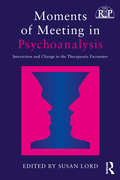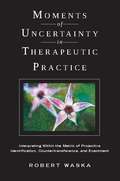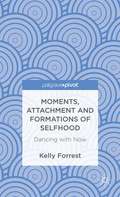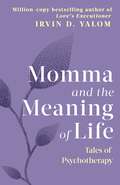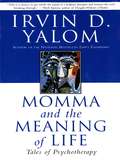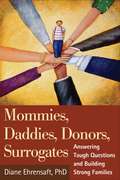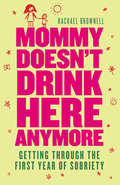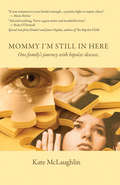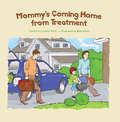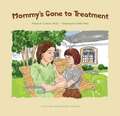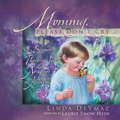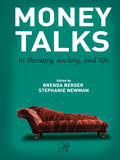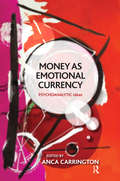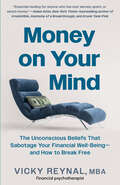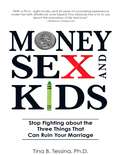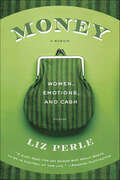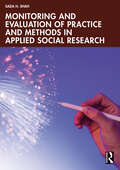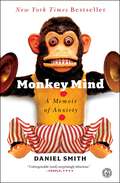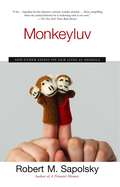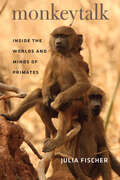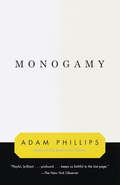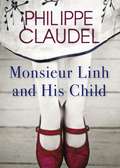- Table View
- List View
Moments of Meeting in Psychoanalysis: Interaction and Change in the Therapeutic Encounter (Relational Perspectives Book Series)
by Susan LordThere are moments of connection between analysts and patients during any therapeutic encounter upon which the therapy can turn. Moments of Meeting in Psychoanalysis explores how analysts and therapists can experience these moments of meeting, shows how this interaction can become an enlivening and creative process, and seeks to recognise how it can change both the analyst and patient in profound and fundamental ways. The theory and practice of contemporary psychoanalysis and psychoanalytic psychotherapy has reached an exciting new moment of generous and generative interaction. As psychoanalysts become more intersubjective and relational in their work, it becomes increasingly critical that they develop approaches that have the capacity to harness and understand powerful moments of meeting, capable of propelling change through the therapeutic relationship. Often these are surprising human moments in which both client and clinician are moved and transformed. Moments of Meeting in Psychoanalysis offers a window into the ways in which some of today’s practitioners think about, encourage, and work with these moments of meeting in their practices. Each chapter of the book offers theoretical material, case examples, and a discussion of various therapists’ reflections on and experiences with these moments of meeting. With contributions from relational psychoanalysts, psychotherapists and Jungian analysts, and covering essential topics such as shame, impasse, mindfulness, and group work, this book offers new theoretical thinking and practical clinical guidance on how best to work with moments of meeting in any relationally oriented therapeutic practice. Moments of Meeting in Psychoanalysis will be of great interest to psychoanalysts, psychoanalytic psychotherapists, psychologists, social workers, workers in other mental health fields, graduate students, and anyone interested in change processes.
Moments of Uncertainty
by Robert WaskaOne of therapy's greatest challenges is the moment of transference, when a patient unconsciously transfers emotion or desire to a new and present object, in some cases the therapist. During the course of treatment, a patient's projections and the analyst's struggle to divert them can stress, distort, or contaminate the therapeutic relationship. It may lead to various forms of enactment, in which the therapist unconsciously colludes with the client in interpretation and treatment, or projective identification, in which the client imposes negative feelings and behaviors onto the therapist, further interfering with analysis and intervention.
Moments of Uncertainty in Therapeutic Practice: Interpreting Within the Matrix of Projective Identification, Countertransference, and Enactment
by Robert WaskaOne of therapy's greatest challenges is the moment of transference, when a patient unconsciously transfers emotion or desire to a new and present object-in some cases the therapist. During the course of treatment, a patient's projections and the analyst's struggle to divert them can stress, distort, or contaminate the therapeutic relationship. It may lead to various forms of enactment, in which the therapist unconsciously colludes with the client in interpretation and treatment, or it can lead to projective identification, in which the client imposes negative feelings and behaviors onto the therapist, further interfering with analysis and intervention.Drawing on decades of clinical case experience, Robert Waska leads practitioners through the steps of phantasy and transference mechanisms and their ability to increase, oppose, embrace, or neutralize analytic contact. Operating from a psychoanalytic perspective, he explains how to cope professionally with moments of transference and maintain an objective interpretive stance within the ongoing matrix of projective identification, countertransference, and enactment. Each chapter discusses a wide spectrum of cases and clinical situations, describing in detail the processes that invite a playing out of the patient's phantasies and the work required to reestablish balance. Refreshingly candid, Waska recognizes the imperfections of analysis yet reaffirms its potential for greater psychological integration and stability for the patient. He acknowledges the limits and frequent roadblocks of working with difficult patients, such as those who suffer from psychic retreat, paranoid phantasies, and depressive anxieties, yet he indicates an effective path for resetting the clinical moment and redirecting the course for treatment.
Moments, Attachment and Formations of Selfhood
by Kelly ForrestUsing innovative empirical data, this book presents a unique approach to looking at moments, exploring the deeper meanings of why memories stand out and how they influence an individual's sense of self. Forrest challenges the privileged position of narrative coherence as the basis for healthy identity and formations of selfhood.
Momma And The Meaning Of Life: Tales of Psycho-therapy
by Irvin YalomThis classic medium, first popularised by Freud and, more recently, by Oliver Sacks and Yalom himself, provides a fascinating insight into the human condition and our search for happiness. Contains six absorbing case studies which reveal the intricacies our psychological landscapes. Provides a fascinating insight into the human condition and our search for happiness. Explores the unique dynamic of the relationship between therapist and client. Absorbing and deeply thoughtful, Momma and the Meaning of Life is a work of rare insight and imagination.
Momma and the Meaning of Life: Tales From Psychotherapy
by Irvin D. YalomAs the public grows disillusioned with therapeutic quick fixes, people are looking for a deeper psychotherapeutic experience to make life more meaningful and satisfying. What really happens in therapy? What promises and perils does it hold for them?<P><P>No one writes about therapy - or indeed the dilemmas of the human condition - with more acuity, style, and heart than Irvin Yalom. Here he combines the storytelling skills so widely praised in Love's Executioner with the wisdom of the compassionate and fully engaged psychotherapist. In these six compelling tales of therapy, Yalom introduces us to an unforgettable cast of characters: Paula, who faces death and stares it down; Magnolia, into whose ample lap Yalom longs to pour his own sorrows; Irene, who learns to seek out anger and plunge into it. And there's Momma, old-fashioned, ill-tempered, who drifts into Yalom's dreams and tramples through his thoughts. At once wildly entertaining and deeply thoughtful, Momma and the Meaning of Life is a work of rare insight and imagination.
Mommies, Daddies, Donors, Surrogates
by Diane EhrensaftIf you need help having a baby, reproductive technology can supply the answer. But it also raises a host of questions that won't arise until after the child is born What will you say to "Where did I come from?" when the answer includes a donor or surrogate? Will knowing the truth about how you conceived make your child love you less? Will having a baby with someone else strain your relationship with your spouse or partner? What will grandparents, family members, friends, and coworkers think? Dr. Diane Ehrensaft--a developmental and clinical psychologist who's worked with families formed using assisted reproductive technology for more than 20 years--helps you anticipate the big questions and find solutions that are right for you and your loved ones. Dr. Ehrensaft offers information, support, and straightforward advice for coping with private worries, confronting public prejudices, and raising happy, healthy children. Single or married, straight or gay, anyone looking forward to the joys and challenges of building a family with the help of a donor or surrogate will discover a wealth of thought-provoking ideas and fresh insights in this sensitive, practical, and positive book.
Mommy Doesn't Drink here Anymore: Getting Through the First Year of Sobriety
by Rachael BrownellPart recovery, part self-help, and all real, raw stories of waking up for the sake of your self and your children, Mommy Doesn't Drink Here Anymorefollows one mother's journey from cocktail mama to sober mama. The loving mother of twins and a newborn, Brownell used alcohol to maintain a sense of her adult self and be more than "just mommy. " It didn't take long before her drinking spiraled out of control, consuming her life and marriage, and she realized that she needed serious help. Both heart-wrenching and inspiring, this is Brownell's true-life story, from the first thirty days to the year mark. Mommy Doesn't Drink Here Anymoreis not a book that preaches or simply takes the reader through the Twelve Steps. It provides hope and motivation to get into a program and balance your life as a mother and a recovering alcoholic.
Mommy I'm Still In Here
by Kate MclaughlinMommy I'm Still In Here clarifies myths and misunderstandings about bipolar disorder through the lives of Kate McLaughlin's two teenaged children and provides vital information to a public frequently misled by sensationalist media and inaccurate Hollywood portrayals. This book supports, educates, and informs the reader, offering hope and encouragement.
Mommy's Coming Home from Treatment
by Mike Motz Denise D. CrossonIn this sequel to Mommy's Gone To Treatment, Janey learns to face some of the challenges a family must confront when a parent returns from addiction treatment as the whole family adjusts to a new way of life. Includes a parent guide to help talk with children about addiction and treatment and what happens after a parent/loved one returns.
Mommy's Gone to Treatment
by Mike Motz Denise D. CrossonWritten specifically for children ages 4 to 8, this brightly illustrated book candidly tackles the confusion and fear children face when a parent enters treatment. With vibrant illustrations by Mike Motz and a parent guide page included, parents now have a helpful tool to ease children's apprehension when someone they love must confront reality.
Mommy, Please Don't Cry
by Linda Deymaz Laurie Snow HeinMommy, Please Don't Cry is a book of love and comfort for mothers who have experienced the deep sorrow of losing a child. Serene illustrations frame gentle words that describe heaven from a child's perspective. With room for the reader's personal reflections at the end of the book, every page is a poignant gift of hope and healing. "Our stories are all different, but our pain is the same," writes Linda. "We are mothers who will forever grieve the loss of our children. And yet, there is hope for our troubled souls."From the Hardcover edition.
Money Talks: in Therapy, Society, and Life (Psychoanalysis in a New Key Book Series)
by Brenda Berger Stephanie NewmanSometimes referred to as "the last taboo," money has remained something of a secret within psychoanalysis. Ironically, while it is an ingredient in almost every encounter between analyst and patient, the analyst's personal feelings about money are rarely discussed openly or in any great depth. So what is it about money that relegates it to the background, both on the couch and off? In Money Talks, Brenda Berger, Stephanie Newman, and their excellent cast of contributors address this and other questions surrounding the tender topic of money, how we talk about it, and how it talks to us. Its multiple meanings are explored in the contexts of patients and analysts and the ways in which they relate, in the training and practice of the analysts themselves, as well as the psychological and cultural consequences of having too much or too little in both flush and tight economic times. Throughout, a clinical sensibility is brought to bear on money's softly spoken place in therapy and life. Money Talks paves the way for an open discourse into the psychology of money and its pervasive influence on the psyche of both patient and analyst.
Money as Emotional Currency: Money As Emotional Currency (Psychoanalytic Ideas And Applications Ser.)
by Anca CarringtonThis book explores the trace of the emotional undercurrent stirred by money from its beginnings in childhood to its consolidation into adult life, through love and work, for individuals and society alike, and with an emphasis on ordinary development, rather than on pathology.
Money on Your Mind: The Unconscious Beliefs That Sabotage Your Financial Well-Being - and How to Break Free
by Vicky ReynalDiscover how your thoughts, emotions, and past experiences shape your money habits—and find your way to financial freedom. Do you overspend or make impulse purchases you regret later? Do you never feel like enough money is enough? Do you hide purchases from your partner? Do you spend extravagantly on others to win their approval? Do you resist spending money even on things you know you need? One of your most important relationships is the one you have with money, yet you may not be aware of the complex web of emotions and past experiences that are really driving your money habits. Money on Your Mind helps you unpack these psychological hurdles and start making better financial choices. Through a mix of case studies, client stories, and her expertise in psychotherapy, financial psychotherapist Vicky Reynal reveals how an emotionally absent parent can result in comfort shopping, how bullying in school can lead to overspending, how absorbing a parent’s lack of boundaries can interfere with making rational financial decisions, and much more. Then, she helps you shift those ingrained attitudes and beliefs so you can stop falling into the same old spend-ing traps. You’ll learn to: Recognize your spending triggers Let go of a scarcity mindset Free yourself of spending anxiety Take control over your money habits With a better understanding of the root causes of your money struggles, a more secure financial future is possible.
Money, Sex, and Kids: Stop Fighting about the Three Things That Can Ruin Your Marriage
by Tina B TessinaUnhappy couples may be unhappy each in their own way - but they're all fighting about the same things: money, sex and kids. These three topics often cause conflict that can erode even the strongest marriages. In this prescriptive, practical guide, popular author and therapist Dr. Tina B. Tessina shows couples how to deal with their differences in these critical areas, and resolve them before they take their toll on their relationship. They learn the proper etiquette for marital debate, as well as creative approaches to solving the problems that confront them in their life together.Given today's high divorce rate statistics and the so-called age of the 'serial marriage' - Money, Sex and Kids helps couples avoid the divorce court by addressing the divisive issues most likely to tear their unions apart.
Money, a Memoir: Women, Emotions, and Cash
by Liz PerleA “remarkable” and revealing account of one woman’s finances—and how women’s thoughts and feelings about money can wreak havoc on their lives (Publishers Weekly, starred review).Long ago, and not entirely consciously, Liz Perle made a quiet contract with cash: she would do what it took to get it—work hard, marry right—but she didn’t want to have to think about it too much. The subject of money had, since childhood, been quietly sidestepped, a shadowy factor whose private influence was impolite to discuss. This denial eventually exacted its price, however, when a divorce left Perle with no home, no job, and a four-year-old with a box of toys. She realized she could no longer afford to leave her murky and fraught relationship with money unexamined.What Perle discovered as she reassembled her life was that almost every woman she knew also subscribed to this strange code of discretion—even though it laced through their relationships with their parents, lovers, husbands, children, friends, coworkers, and communities. Women who were all too willing to tell each other about their deepest secrets or sexual assets still kept mum when it came to their financial ones.In Money, A Memoir, Perle attempts to break this silence, adding her own story to the anecdotes and insights of psychologists, researchers, and more than 200 “ordinary” women. It turned out that when money was the topic, most women needed permission to talk. The result is an insightful, unflinching look at the subtle yet commanding influence of money on our every relationship.“Profiles dozens of everyday women, spotlighting the anxiety, embarrassment and guilt money causes them. Commentary from financial experts, sociologists and others helps demonstrate Perle’s thesis: women cannot afford to be ambivalent about money and must learn to separate feelings from finance.” —Publishers Weekly (starred review)
Monitoring and Evaluation of Practice and Methods in Applied Social Research
by Sada H. ShahMonitoring and Evaluation of Practice and Methods in Applied Social Research is a comprehensive guide delving into the core concepts, tools, methods, and approaches of monitoring and evaluation (M&E). This book reveals the roots of M&E, illustrating its evolution from academia into a burgeoning field of science across various contexts. The challenge practitioners face lies in the inconsistent terminology used for identical concepts among humanitarian organizations, hindering the growth of M&E through shared learning. Embracing an abductive approach, this book seeks to establish M&E as distinct fields within social research. In doing so, it bridges the philosophical gap between novice and expert social researchers and provides a consolidated resource based on real-world experiences. Written by an expert with over a decade of hands-on experience in applied social research, this book serves as an invaluable tool, offering insights into the diverse landscape of M&E, enabling students and practitioners to navigate various contexts with ease. Nongovernmental organizations (NGOs), United Nations (UN) bodies, and organizations involved in M&E will also find this book instrumental, creating a bridge of standardized concepts, nomenclature, and approaches.
Monkey Mind: A Memoir of Anxiety
by Daniel SmithAnxiety once paralyzed Daniel Smith over a roast beef sandwich, convincing him that a choice between ketchup and barbeque sauce was as dire as that between life and death. It has caused him to chew his cuticles until they bled, wear sweat pads in his armpits, and confess his sexual problems to his psychotherapist mother. It has dogged his days, threatened his sanity, and ruined his relationships. <P><P>In Monkey Mind, Smith articulates what it is like to live with anxiety, defanging the disease with humor, traveling through its demonic layers, and evocatively expressing its self-destructive absurdities and painful internal coherence. With honesty and wit, he exposes anxiety as a pudgy, weak-willed wizard behind a curtain of dread and tames what has always seemed to him, and to the tens of millions of others who suffer from anxiety, a terrible affliction.
Monkeyluv: And Other Essays on Our Lives as Animals
by Robert M. SapolskyHow do imperceptibly small differences in the environment change one’s behavior? What is the anatomy of a bad mood? Does stress shrink our brains? What does People magazine’s list of America’s “50 Most Beautiful People” teach us about nature and nurture? What makes one organism sexy to another? What makes one orgasm different from another? Who will be the winner in the genetic war between the sexes? Welcome to Monkeyluv, a curious and entertaining collection of essays about the human animal in all its fascinating variety, from McArthur fellow Robert M. Sapolsky, America’s most beloved neurobiologist/primatologist. Organized into three sections, each tackling a Big Question in natural science, Monkeyluv offers a lively exploration of the influence of genes and the environment on behavior; the social and political—and, of course, sexual—implications of behavioral biology; and society’s shaping of the individual. From the mating rituals of prairie dogs to the practice of religion in the rain forest, the secretion of pheromones to bugs in the brain, Sapolsky brilliantly synthesizes cutting-edge scientific research with wry, erudite observations about the complexity of being human. Thoughtful, engaging, and infused with pop-cultural insights, this collection will appeal to the inner monkey in all of us.
Monkeytalk: Inside the Worlds and Minds of Primates
by Frederick B. Henry Jr. Julia FischerMonkey see, monkey do—or does she? Can the behavior of non-human primates—their sociality, their intelligence, their communication—really be chalked up to simple mimicry? Emphatically, absolutely: no. And as famed primatologist Julia Fischer reveals, the human bias inherent in this oft-uttered adage is our loss, for it is only through the study of our primate brethren that we may begin to understand ourselves. An eye-opening blend of storytelling, memoir, and science, Monkeytalk takes us into the field and the world’s primate labs to investigate the intricacies of primate social mores through the lens of communication. After first detailing the social interactions of key species from her fieldwork—from baby-wielding male Barbary macaques, who use infants as social accessories in a variety of interactions, to aggression among the chacma baboons of southern Africa and male-male tolerance among the Guinea baboons of Senegal—Fischer explores the role of social living in the rise of primate intelligence and communication, ultimately asking what the ways in which other primates communicate can teach us about the evolution of human language. Funny and fascinating, Fischer’s tale roams from a dinner in the field shared with lionesses to insights gleaned from Rico, a border collie with an astonishing vocabulary, but its message is clear: it is humans who are the evolutionary mimics. The primate heritage visible in our species is far more striking than the reverse, and it is the monkeys who deserve to be seen. “The social life of macaques and baboons is a magnificent opera,” Fischer writes. “Permit me now to raise the curtain on it.”
Monoclonal Antibodies in Headache: From Bench to Patient (Headache)
by Paolo Martelletti Antoinette Maassen van den BrinkIntended to promote a more appropriate and modern therapeutic approach to migraine management, this book is the first to deal with monoclonal antibodies in this context. Authored by the most respected migraine experts from around the globe and drawing on the lessons learned in both clinical trials and clinical practice, it reviews the current state of knowledge on this important therapeutic innovation, which has produced impressive data in randomized controlled trials, and the efficacy and safety of which have been confirmed in day-to-day real-world use. Given its scope, the book will appeal to a broad range of specialists, including pharmacologists, clinical pharmacologists, neurologists and internists, but also to residents and medical students.
Monogamy
by Adam PhillipsIn this sparkling, provocative collection of meditations on coupledom and its discontents, Adam Phillips manages to unsettle one of our most dearly held ideals, that of the monogamous couple, by speculating upon the impulses that most threaten it--boredom, desire, and the tempting idea that erotic fulfillment might lie elsewhere. With 121 brilliant aphorisms, the witty, erudite psychoanalyst who gave us On Kissing, Tickling, and Being Bored distills the urgent questions and knotty paradoxes behind our mating impulse, and reveals the centrality of monogamy to our notions of marriage, family, the self--in fact, to everything that matters. The only truly monogamous relationship is the one we have with ourselves. Every marriage is a blind date that makes you wonder what the alternatives are to a blind date. There's nothing more scandalous than a happy marriage.
Monsieur Linh and His Child
by Philippe ClaudelTraumatized by memories of his war-ravaged country, his son and daughter-in-law dead, Monsieur Linh travels to a foreign land to bring the child in his arms to safety. To begin with, he is too afraid to leave the refugee centre, but the first time he braves the freezing cold to walk the streets of this strange, fast-moving town, he encounters Monsieur Bark, a widower whose dignified sorrow mirrors his own. Though they have no shared language, an instinctive friendship is forged; but Monsieur Linh's stay in the dormitory is only temporary. Sooner or later he and his child must find a permanent home.Delicate and restrained, but with an extraordinary twist, Monsieur Linh and His Child is an immensely moving novel of perfect simplicity, by the author of Brodeck's Report.
Monsieur Linh and His Child
by Philippe ClaudelTraumatized by memories of his war-ravaged country, his son and daughter-in-law dead, Monsieur Linh travels to a foreign land to bring the child in his arms to safety. To begin with, he is too afraid to leave the refugee centre, but the first time he braves the freezing cold to walk the streets of this strange, fast-moving town, he encounters Monsieur Bark, a widower whose dignified sorrow mirrors his own. Though they have no shared language, an instinctive friendship is forged; but Monsieur Linh's stay in the dormitory is only temporary. Sooner or later he and his child must find a permanent home.Delicate and restrained, but with an extraordinary twist, Monsieur Linh and His Child is an immensely moving novel of perfect simplicity, by the author of Brodeck's Report.
